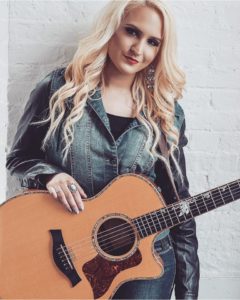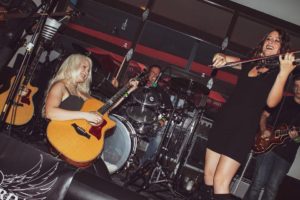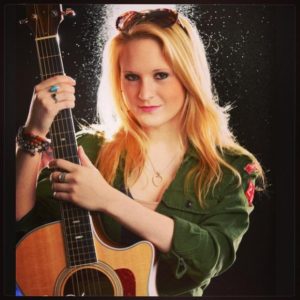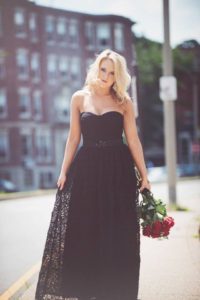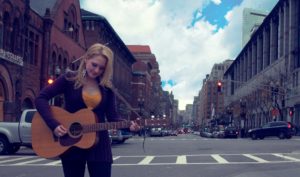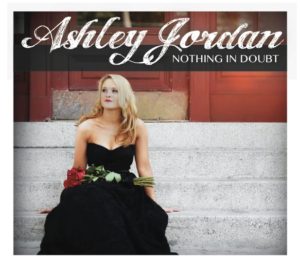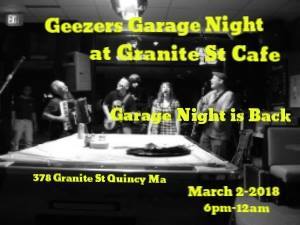Ashley Jordan has come a long way since she was at 13 year old aspiring singer-songwriter busking on the streets of Harvard Square. The 25 year old singer-songwriter has been featured on Boston radio’s Mix 104 which had lead to her performing in front of 40,000 people at the station’s annual MixFest music festival. Last December, Jordan received her second Boston Music Award for Country Artist of the Year.
“That was an incredible moment,” Jordan said. “It was just an honor to be nominated for the second year in a row. That was so, so cool for me and my band. It was definitely a surprise to win that and get to play the House Of Blues Stage.”
While many know of Jordan’s appearance before 40,000 MixFest fans at Boston esplanade’s Hatch Shell, many might not know of her long road to get there. Landing the opener slot at MixFest requires an artist to compete.
“They did a great competition a couple years back. I had gone the first year, and I did not win,” she said.. “But, it was a really cool experience to get to try out for it with the hope of getting to play the MixFest gig some day. The radio host, Matthew Reed is such an amazing guy. He said ‘You should come back. You should try again‘. I tried out again the next year and winning it was so amazing. It felt kind of surreal to get to play that stage and to get to play in front of 40,000 people. It was such a big moment in my career, and I think it pushed it forward quite a bit.”
Undaunted, Jordan faced those 40,000 MixFest fans with total confidence. “It was crazy,” she said. “It’s funny. I didn’t feel nervous, maybe just because they were such a supportive crowd. It was like all adrenaline too. When you get up there, it was just so exciting. I even at one point I was like: ‘You guys, I don’t know if there’s ever gonna be another moment like this. So, I have to take a selfie with you guys‘. It was that cool, and I’m so thankful to Mix 104 for their support and especially Matthew Reed. They’re such great people down at that station. It was a huge part of my career.”
Jordan’s last CD, He’s Crazy, was inspired by a bad relationship. It was also a turning point in her career to record an album with a sound that has evolved greatly since her early CDs.
“I definitely went through a pretty terrible break up before finishing that album,” she said. “I went in with my producer Joe Merrick who’s an incredible producer. I was just going to do an EP, like a couple songs.” Merrick, though, convinced her that she needed to share more of her material.
“We just kind of kept going and going,” she said. “It turned into a year project of all of these songs. It was almost like a diary. It was a way to release all of those things that happened. I got it off of my chest. I said to (Merrick) it’s like a therapy session. We’re getting through this together. It ended up being such a cool project with him and we just jibed really great together. It became the album He’s Crazy. I’m proud of it. It’s cool to go back and hear where I was in that place in my life.”
Many of Jordan‘s songs have a universal theme. Her song “Weapon” is what every warring couple thinks it is. “When you get into many different fights with the same person,” she said. “You say like ‘Can we put down our weapons and stop spinning this into a war every time that we’re having a conversation?’ A lot of people can relate to that. Sometimes someone just knows how to push your buttons. It’s not necessarily talking about weapons but with words.”
Jordon has a song titled “Come Home” on that album. In the video she had filmed for the song her boyfriend, a Marine Core troop, appears in his Marine uniform representing his return for his latest tour of duty.
“I was really excited about that one,” she said. “We ended up doing a really great video to try to talk about the story. It’s talking about relationships when someone’s gone away. It’s talking about you sitting there thinking about the power of that love and what that love means to you. Thinking about that person promised you that they’re going to come home, that they’re going to be there for you in the end. It was a cool thing to get the shoot to go along with at that song. It has a very special place in my heart.”
“Love Wolf” shows Jordan’s love for rock and roll music. Inspired by its aggression, she wrote about a person who is a strong individual. “It’s metaphorical,” she said. “In a way, it’s talking about the music industry. It can be pretty cut throat but you just keep going along. If that means you have to stand alone some times, that’s OK.”
“So Far Gone” is about a relationship that was over before it even began. A person who had come into her life and she had realized that as they went along that there was a lot of deception, a lot of complicated emotion with it because the person just didn’t really know where he was headed.
“I felt grief and love and pain because I’m afraid that you’re so far gone, and not knowing where that’s person’s at any given moment it was just the confusion of that relationship and where it was going.”
While performing at last December’s Boston Music Awards at House of Blues, Jordan’s tune “Smoke On The Gun,“ aside from being quite good, drew gasps for its dark, aggressive nature. Underneath its gritty melody and dark tones, the song simply tells a story.
“It’s supposed to be an outlaw influenced country song,” she said. “I’m depicting an out west kind of movie. We ended up doing a music video for that song to try to explain the storyline and everything. It’s an interesting one.”
Although Jordan adds a second fiddle player for her larger shows, she plays out, usually, as a five piece. Fiddler Kathryn Haddad, lead guitarist Alex Sennett, bass player Jeff Pongonis, and drummer Marc Sherman round out her live team.
“We built up over the years and finally feel like we’re at a really strong place,” Jordan said. “We have a bunch of shows going on this summer. Hopefully, later in the fall, we will try to do a small tour. We just love playing together and doing the big shows and getting those opportunities. It’s really cool. Getting to showcase. That is a blast.”
Jordan’s first three CDs tended toward more sweet pop music. She’s now more into feisty country with true grit in the fiddle and more edgy twang in the guitars. Her first albums were more acoustic based. Then, she transferred into country on her third CD Nothing In Doubt. There, she toyed with rock, country, and a serious singer-songwriter side.
“I realized after that how much I loved that sound and remaking that sound with the band,” she said. “Ever since then I’ve had that gritty, outlaw songs keep coming in different ways in different formats. A lot of it is storytelling too, picturing a certain scene in your head like a movie and just wanting to tell it. That’s what I do love about country music, especially the outlaw music. It can get gritty and interesting, and sometimes bizarre. But, it’s really fun to put yourself in that mode and into that character that you’re trying to portray.”
Often, Jordan brings her solo acoustic version of a song to her band. After her band mates put their touches to it, it turns into something bigger, cooler than what she started with. Recording, in fact, is Jordan’s favorite aspect to her music career.
“Don’t get me wrong. I love performing. Performing is one of my favorite things. But, there’s something about getting in the studio and just being in your own zone and recording and having a band listen and record. I think that’s a super, super fun process.”
While some get religion in their youth, Jordan got country during hers. Growing up in the Ozarks with a musical family ladled her a lot of influences. Her father’s father was a musician and the family attended many live shows there. Jordan’s father had recorded the elder family members songs about coal mining, building a home for their families. Jordan’s uncle thought even back then that her voice was suited for country music.
“I don’t know what it was with my voice,” she said. “It’s kind of a southern sound or maybe a yodel or lilt to my voice. I’ve always loved country music and I always felt that that’s what it was. But, sometimes when you’re playing acoustically it’s hard to figure out what that sound is going to look like and sound like.”
She began her own career busking in Boston at age 13.. Her parents respected her decision to go into music, and they accompanied her to her outdoor gigs in Harvard Square.
“A big part of where I’m at in my career is a big thanks to my family and my parents,” she said. “When I was young kid, I said ‘Look, I want to go a different route. I want to do music. This is who I want to be‘. I think the coolest thing ever was that they said ‘OK, let’s do it.’”
In those early days of her career, Jordan had to play what seemed like a million open mics in which she had to sign up, wait until midnight, then she’d play one song. Jordan was inspired by a tattooed covered, shaved head artist named John Gerard at a Framingham open mic. That man’s songs, voice, and guitar blew her away. She approached him after his set and told him she wanted to play guitar just like him. She asked for lessons and he became her mentor. He told her that even if there is only one person left in the room when her turn came, he wanted her to play like it’s the last time she was ever going to play.
“That really stuck with me,” she said. “He changed the way that I looked at performing and writing. The whole reason I started going into street performing in Harvard Square and in the subways was because of him. He had a really incredible story. He was even homeless for a while and he supported himself by street performing. He inspired me to (busk).”
Jordan found that street performing was a good experience to learn her craft. She could play original songs that she had in the works, building her confidence, watching people light up when they heard her voice.
“You have to keep doing your thing with sirens and cars and busses going by. I actually fell in love with it. I’d gone back a couple of years ago to the same place where I used to play all the time. Some lady walked by and said ‘Oh, my gosh. You’re that little girl who used to be here all the time.’ I’ve met some of the coolest people I know from street performing. One of the first gigs I ever got was at Club Passim. Somebody who worked there walked by and had his card in my face with his number on it. He said ‘You know, you don’t always have to play outside. I think you could come and play inside sometime.’” Her big moment at the legendary venue that had once hosted Bob Dylan and other big names lead to her learning how to acquire more gigs.
Jordan now has her eyes on the future. She is currently working on her fifth album. She’s been discussing her next work with band mates, producers, and managers. She has about 25 unrecorded songs and she loves every single one of them. She’s debating whether to record an EP in Nashville or to record some of her CD here in New England.
“I have a direction in mind,” she said. “I want my singer-songwriter side to come out in some of the songs. Some of the bigger songs, I want the band to be featured for that southern rock, country rock side. It’s a balancing act. You want to promote every side of yourself that you feel you want to have exposed in an album like that. I think the goal is to make a really kick ass album. I’m a perfectionist so I go back and forth, back and forth over certain songs. I’m really hoping the next album is a taking off point for where I want to go.”
